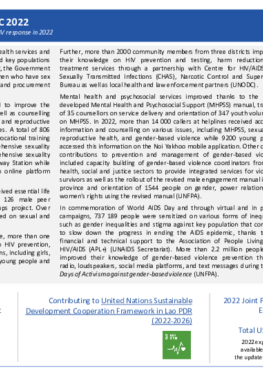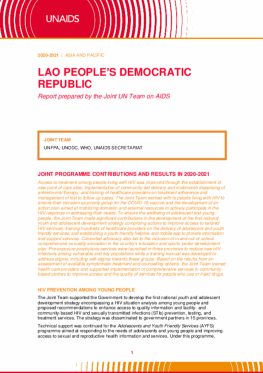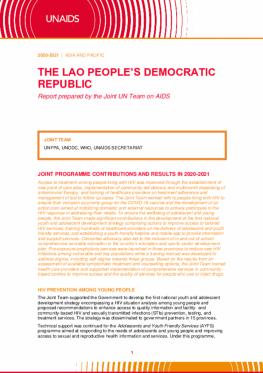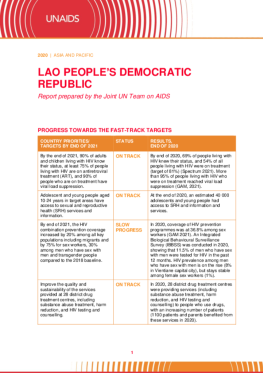|
Lao People's Democratic Republic
In Lao PDR, the Joint Programme made significant contributions in scaling up access to HIV prevention and treatment services and health education among young people and key populations. Expansion of pre-exposure prophylaxis (PrEP) benefited over 700 people, primarily men who have sex with men and transgender women (WHO).
More than 300 000 young people accessed sexual and reproductive health services thanks to the national standardization of Adolescent and Youth Friendly Services (AYFS) and training of more than 230 healthcare providers on provision of these services. A total of 747 000 primary and secondary school students received integrated CSE while 30 peer educators delivered out of school CSE to 300 vulnerable adolescents and young people (UNFPA). In addition, the National University of Laos integrated SRH into its academic course and established on-site counselling for students strengthening health education and services in higher education (UNFPA).
As part of the Me, My Body, My Planet, My Future campaign, more than one million young people improved their knowledge of HIV prevention through social media platforms and personal engagement, thanks to the active participation of 7800 adolescents, educators and school leaders and technical support from the Joint Programme. A total of 25 000 people accessed HIV, SRH and mental health support services through telephone helplines and the Noi Yakhoo mobile application (UNFPA). In addition, 3000 adolescents received essential life skills education and 9100 community members were sensitized on CSE and sexual and reproductive health and rights (SRHR) of adolescent girls, through the Nang-Noi Girls’ Groups project (UNFPA).
In commemoration of World AIDS Day and through virtual and in person campaigns, over 730 000 people were sensitized on various forms of inequality, such as gender inequalities and stigma against key population that continue to slow down the progress in ending the AIDS epidemic, thanks to the financial and technical support to the Association of People Living with HIV/AIDS (APL+) (UNAIDS Secretariat). More than 2 million people also improved their knowledge of gender-based violence prevention through radio, loudspeakers, social media platforms, and text messages during the 16 Days of Activism against gender-based violence. In one province, 1500 individuals, predominantly men improved their understanding of gender and power dynamics and embraced a culture of respect through a revised male engagement manual. Implementation of Essential Services Package for Women and Girls subject to violence further ensured access to multisectoral essential services for about 2400 people who experienced gender-based violence (UNFPA). In addition, more than 3000 people, including women and young people improved their understanding of HIV prevention and drugs through an awareness campaign organized covering 15 villages in three districts (UNODC).
Finally, more than US$ 7.4 million was mobilized from the Global Fund to scale up HIV prevention and treatment programmes between 2024 and 2026 to ensure no one is left behind, thanks to the strategic support from the Joint Programme (WHO, UNAIDS Secretariat).






